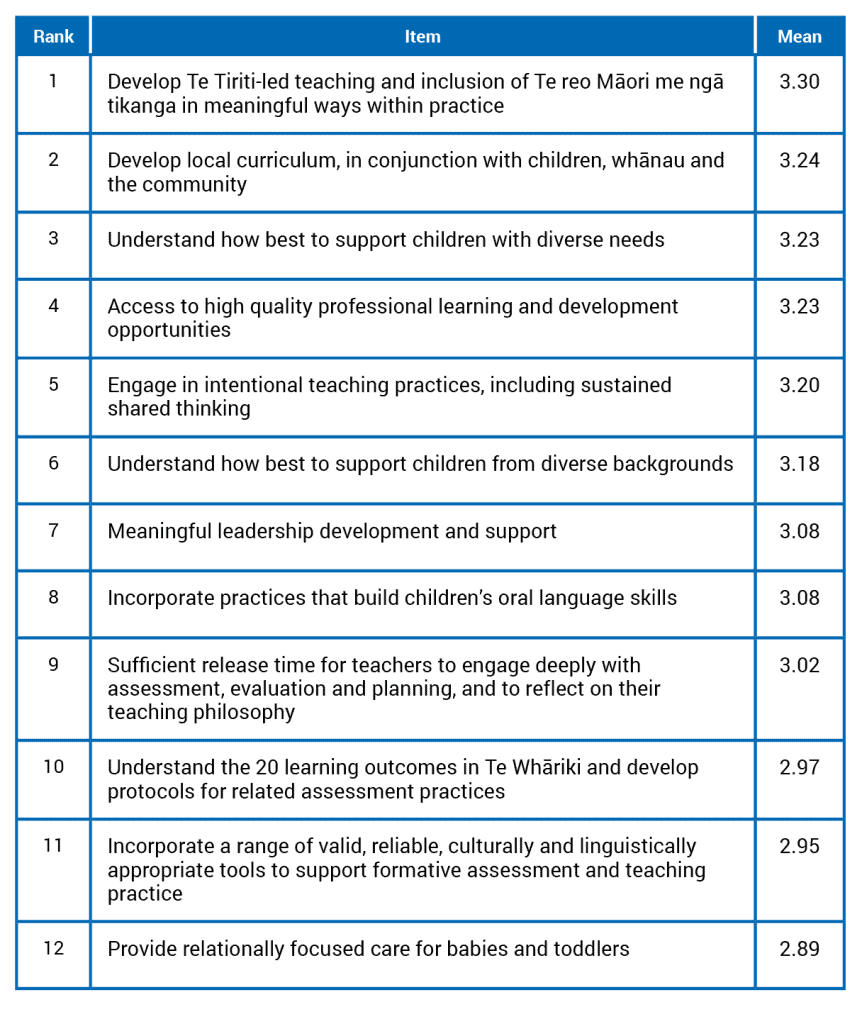In March this year The Education Hub set out to explore the most significant teaching and learning challenges (or problems of practice) faced by teachers in New Zealand ECE centres which, if addressed, have the greatest potential to ensure equitable outcomes for children. We embarked on this work primarily to ensure that we were targeting our support for ECE centres and teachers on teaching and learning issues that really matter to them. However, we also thought that the findings would provide an interesting snapshot of thinking in the sector.
The study was composed of two rounds (more detailed information about the methodology can be found at the end of this article). The first round asked educational experts to identify what they considered to be the most significant teaching and learning challenges faced by teachers in New Zealand schools. From their responses we identified 12 problems of practice, which formed the basis of round two, a survey to teachers and centre leaders. We received 512 responses to the survey, from teachers across all regions and all service types (although private and community centres were most highly represented followed by kindergartens). Participants’ teaching experience ranged from less than 1 year to over 20 years, and we had participants in teaching, leadership and managerial roles.

Findings
Participants rated each problem of practice on a 4 point scale from 1 (not a priority or area of need in my school or practice) through to 4 (a high priority or area of need in my school or practice). The table below ranks the items from the greatest priority through to lowest priority.
The responses of the experts from round 1 provide valuable insight into how and why these problems of practice are occurring. A consistent theme, which was present in nearly all of the responses, was the lack of time and resource ECE teachers have to engage in high quality professional learning opportunities, including deep reflection about and discussion on aspects of their practice. One respondent articulated the situation:
Some of the many significant challenges or priority areas related to teaching practice faced by teachers are: release time to plan, research, and document and approaches to documentation that intentionally work with the children on release time (in other words to be ‘on the floor’ but not ‘on ratio’; limited opportunities for PD and interactions with the wider sector in the development and sharing of teaching practices including Kahui Ako, conferences, seminars where teachers have the opportunity to be part of their professional community and to have this time recognised and compensated so that it is clear that such time is essential to their practice.
Intwined with this was a recognition of the range of knowledge that ECE teachers need in and for their practice, and that support is required to enable teachers to keep up to date with new research and new ideas in practice. Connected to this was the importance of teachers developing an understanding of the theoretical underpinnings and frameworks shaping key ideas and practices in early childhood education in order to facilitate the deep analysis and interrogation of current practice and the identification of and action towards areas of improvement.
What these findings mean for The Education Hub?
At The Education Hub we are in awe of the commitment of ECE teachers to continually learn and upskill. In our attempt to address these problems of practice, we will continue to produce research reviews for teachers, including, in 2021, reviews on mātauranga Māori, Te reo and bicultural practice in ECE, additional resources across our diverse needs topics including resources on inclusion and social justice, and resources on planning and co-constructing curriculum with children and families. We also will be launching our first online course, which will have a focus on intentional teaching and assessment in ECE as well as continuing with our monthly webinar series, to enable teachers to engage more deeply in topics of interest. While none of these initiatives on their own will be enough to combat the problems of practice identified in this study, we hope that, along with others working on these areas, it will be possible to increasingly support teachers in their practice.
